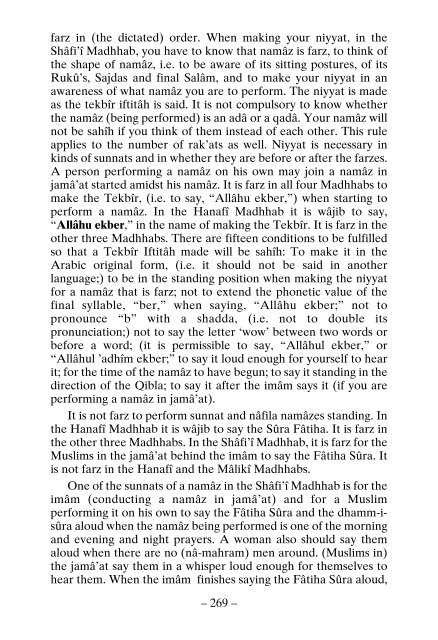O Son !
THE BOOK ‘O SON’ Al-hamdu lillâhi Rabbil ’âlamîn. Wa-s-salâtu wa-s-salâmu ’alâ Rasûlinâ Muhammadin wa Âlihi wa Sahbihi ajma’în. 1– O son! Collecting from books written by the scholars of the Hanafî Madhhab three hundred and sixty hadîth-i-sherîfs and forty-four khabars and also the seven essentials and the five rukns and the seven wâjibs and the fourteen sunnats and the twenty-five mustahabs and the fourteen mufsids of namâz, I have explained them for you. Adapt your acts and deeds to these teachings so that you attain fayz and nejât (salvation)! 2– Also for your information, I have collected a thousand and ninety âdâb (adabs) for you and for other young Muslims like you. If you adapt your actions and acts of worship to these teachings, they will be sufficient for you. If you laze, disobey Allâhu ta’âlâ and cease from these practices and manners, you will be afflicted with slavery and disgrace in the world and subjected to torment in the world to come. If you live up to them and advise your Muslim brothers to do the same, it will be useful for you. They will say blessings over you. And Haqq ta’âlâ will accept their invocations. For, a slave will be pardoned on account of another slave’s invocations for them.
THE BOOK ‘O SON’
Al-hamdu lillâhi Rabbil ’âlamîn. Wa-s-salâtu wa-s-salâmu ’alâ
Rasûlinâ Muhammadin wa Âlihi wa Sahbihi ajma’în.
1– O son! Collecting from books written by the scholars of the
Hanafî Madhhab three hundred and sixty hadîth-i-sherîfs and
forty-four khabars and also the seven essentials and the five rukns
and the seven wâjibs and the fourteen sunnats and the twenty-five
mustahabs and the fourteen mufsids of namâz, I have explained
them for you. Adapt your acts and deeds to these teachings so that
you attain fayz and nejât (salvation)!
2– Also for your information, I have collected a thousand and
ninety âdâb (adabs) for you and for other young Muslims like you.
If you adapt your actions and acts of worship to these teachings,
they will be sufficient for you. If you laze, disobey Allâhu ta’âlâ
and cease from these practices and manners, you will be afflicted
with slavery and disgrace in the world and subjected to torment in
the world to come.
If you live up to them and advise your Muslim brothers to do
the same, it will be useful for you. They will say blessings over you.
And Haqq ta’âlâ will accept their invocations. For, a slave will be
pardoned on account of another slave’s invocations for them.
Create successful ePaper yourself
Turn your PDF publications into a flip-book with our unique Google optimized e-Paper software.
farz in (the dictated) order. When making your niyyat, in the<br />
Shâfi’î Madhhab, you have to know that namâz is farz, to think of<br />
the shape of namâz, i.e. to be aware of its sitting postures, of its<br />
Rukû’s, Sajdas and final Salâm, and to make your niyyat in an<br />
awareness of what namâz you are to perform. The niyyat is made<br />
as the tekbîr iftitâh is said. It is not compulsory to know whether<br />
the namâz (being performed) is an adâ or a qadâ. Your namâz will<br />
not be sahîh if you think of them instead of each other. This rule<br />
applies to the number of rak’ats as well. Niyyat is necessary in<br />
kinds of sunnats and in whether they are before or after the farzes.<br />
A person performing a namâz on his own may join a namâz in<br />
jamâ’at started amidst his namâz. It is farz in all four Madhhabs to<br />
make the Tekbîr, (i.e. to say, “Allâhu ekber,”) when starting to<br />
perform a namâz. In the Hanafî Madhhab it is wâjib to say,<br />
“Allâhu ekber,” in the name of making the Tekbîr. It is farz in the<br />
other three Madhhabs. There are fifteen conditions to be fulfilled<br />
so that a Tekbîr Iftitâh made will be sahîh: To make it in the<br />
Arabic original form, (i.e. it should not be said in another<br />
language;) to be in the standing position when making the niyyat<br />
for a namâz that is farz; not to extend the phonetic value of the<br />
final syllable, “ber,” when saying, “Allâhu ekber;” not to<br />
pronounce “b” with a shadda, (i.e. not to double its<br />
pronunciation;) not to say the letter ‘wow’ between two words or<br />
before a word; (it is permissible to say, “Allâhul ekber,” or<br />
“Allâhul ’adhîm ekber;” to say it loud enough for yourself to hear<br />
it; for the time of the namâz to have begun; to say it standing in the<br />
direction of the Qibla; to say it after the imâm says it (if you are<br />
performing a namâz in jamâ’at).<br />
It is not farz to perform sunnat and nâfila namâzes standing. In<br />
the Hanafî Madhhab it is wâjib to say the Sûra Fâtiha. It is farz in<br />
the other three Madhhabs. In the Shâfi’î Madhhab, it is farz for the<br />
Muslims in the jamâ’at behind the imâm to say the Fâtiha Sûra. It<br />
is not farz in the Hanafî and the Mâlikî Madhhabs.<br />
One of the sunnats of a namâz in the Shâfi’î Madhhab is for the<br />
imâm (conducting a namâz in jamâ’at) and for a Muslim<br />
performing it on his own to say the Fâtiha Sûra and the dhamm-isûra<br />
aloud when the namâz being performed is one of the morning<br />
and evening and night prayers. A woman also should say them<br />
aloud when there are no (nâ-mahram) men around. (Muslims in)<br />
the jamâ’at say them in a whisper loud enough for themselves to<br />
hear them. When the imâm finishes saying the Fâtiha Sûra aloud,<br />
– 269 –

















